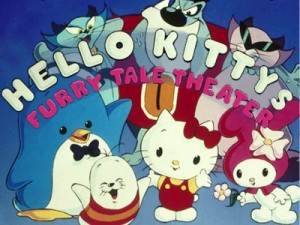Hello Kitty’s Furry Tale Theater: Peter Penguin
“Hello Kitty” started out as a brand in Japan in 1974 and was then brought to the United States in 1976. This brand expanded, which lead to the television show in 1987, Hello Kitty’s Furry Tale Theater. This television show is based off of children’s story books and movies. In the episode, titled “Peter Penguin”, Hello Kitty starts off backstage of the performance asking My Melody if she had gotten her wings ready for the performance because she’s Tinker bell. In next clip, Grandpa Kitty is working on My Melody’s wings, but he is puzzled on which way he should turn the knob, and My Melody comes running in grabbing her wings before Grandpa Kitty could finish the tweaks on them. The play then starts by Hello Kitty and Chip, her brother, playing pirate ship by throwing pillows. Hello Kitty then states that she gives up and her brother Chip says, “Peter Penguin would never give up!” Peter Penguin then emerges through their windows and asks Hello Kitty and Chip to help him with his mission because they are believers. The only restriction when they go to Never say Neverland is to never say “never”. Then it moves to the next clip where Tinker bell is captured by the cat, Captain Claw, who is supposed to depict Captain Hook in Peter Pan. Peter Penguin then flies to Captain Claw’s ship with Hello Kitty and Chip to try and save Tinker bell. There is then a battle with Captain Claw’s army by throwing pies at Peter Penguin and his gang. Peter Penguin and his gang are then captured and are in need to being freed. So Peter Penguin then tricks Captain Claw into saying the word “never,” which then makes the earth destroy itself. Peter Penguin then rescues Tinker bell, but she isn’t waking up so Peter Penguin tells Hello Kitty and Chip to wish her well. In the end, Tinker bell wakes up well and then Hello Kitty and Chip returns back to their home.
The episode that I have summarized above is a typical “Hello Kitty” episode. Thus, it exemplifies Gary Cross’ idea of PLCs as a “fantasy world”. Cross says, “The old view that children should learn from the past and prepare for the future is inevitably subverted in a consumer culture where memory and hope get lost in the blur of perpetual change” (290). The whole plot is based on a fantasy world which is unrealistic, and throughout the whole episode there was not any relation to preparing children in the real world. The episode had animals talking, animals flying, as well as pirates and a land beyond the world. Therefore, I would agree for the most part with Cross’ concept of children not being able to learn major lessons through these fantasy PLCs.

